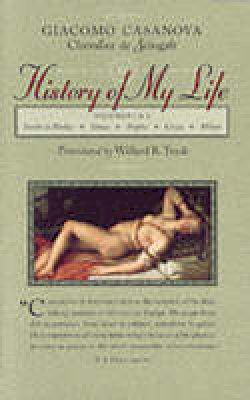
Stock image for illustration purposes only - book cover, edition or condition may vary.
History of My Life: Volumes 1 and 2
Giacomo Casanova
€ 69.54
FREE Delivery in Ireland
Description for History of My Life: Volumes 1 and 2
Paperback. Trask's award-winning translation now appears in paperback for the first time. Translator(s): Trask, Willard R. Num Pages: 728 pages, 32, 32 black & white illustrations. BIC Classification: 2ADF; BGA. Category: (P) Professional & Vocational; (UP) Postgraduate, Research & Scholarly; (UU) Undergraduate. Dimension: 126 x 203 x 45. Weight in Grams: 738.
In volumes 1 and 2, Casanova tells the story of his family, his first loves, and his early travels. With the death of his grandmother, he is sent to a seminary-but is soon expelled. He is briefly imprisoned in the fortress of Sant' Andrea. After wandering from Naples to Rome in search of a patron, he enters the service of Cardinal Acquaviva. About this edition: Because every previous edition of Casanova's Memoirs had been abridged to suppress the author's political and religious views and tame his vivid, often racy, style, the literary world considered it a major event when Willard R. Trask's translation of the complete original text was published in six double volumes between 1966 and 1971. Trask's award-winning translation now appears in paperback for the first time.
Product Details
Publisher
Johns Hopkins University Press
Number of pages
728
Format
Paperback
Publication date
1997
Condition
New
Number of Pages
728
Place of Publication
Baltimore, MD, United States
ISBN
9780801856624
SKU
V9780801856624
Shipping Time
Usually ships in 7 to 11 working days
Ref
99-1
About Giacomo Casanova
Giacomo Casanova was born in Venice in 1725. His parents, both actors, wanted him to become a priest, but their hopes were dashed when, at sixteen, he was expelled from seminary for immoral misconduct. Probably best-known for his reputation as a womanizer, Casanova was in turn a secretary, a soldier in the Venetian army, a preacher, an alchemist, a gambler, a violinist, a lottery director, and a spy. He translated Homer's Iliad into Italian and collaborated with Da Ponte on the libretto for Mozart's Don Giovanni. He retired in 1785 to the castle of a friend-Count Waldstein of Bohemia-in order to write his memoirs.
Reviews for History of My Life: Volumes 1 and 2
Casanova, outed long ago as a flagrant heterosexual, is out again. This time he's out in paperback-the whole of his memoirs in six hefty volumes. What a pity he couldn't be here for a launch party at, say, the Algonquin... Plenty is what the book has-plenty of everything, even without the sex. There are swindles and scandals, pretentions and inventions, clerics, lyrics, and bubbling alembics, sword fights at midnight and complots at the palace, bugs in the beds and bedlam in the tavern, masked balls, ball-ups, and shinnying up drainpipes, flummery, mummery, and summary executions. All that, as the journalists say, plus a pullulating plankton field of biddable, beddable broads, through which Casanova moves with the single-minded hunger of a straining whale, yet somehow brings the whole populated ocean of eighteenth-century society to phosphorescent life. The book teems. It flows. It does everything but end.
Clive James
New Yorker
Trask has written a version in an English fully contemporary yet remarkably Italian in sensibility. With admirable restraint and refinement, he has conveyed the zest and sensuous delight of the original.
National Book Award Citation
These memoirs are compulsive reading... they are the work not only of a highly accomplished seducer but of a literary artist of the highest talents.
J. H. Plumb
New York Times Book Review
There is some [unadulterated smut], of course, quite a bit-but it pales next to the enormousness of the picture Casanova paints of 18th-century Europe: a great theater of intrigue, jostling with political emissaries, spies, impostors, charlatans, runaways, courtesans, Republicans, Freethinkers, Rosicrucians, and Inquisitors.
Boston Globe
Trask expertly rendered this text into English in 1966, and his is the English version to read... Compulsively readable... Certainly, few books better convey the sheer, exuberant joy of being alive and young than these reminiscences.
Michael Dirda
New York Review of Books
These are what Edmund Wilson has rightly called the most interesting memoirs ever written. Indeed, Rousseau, Stendhal, even Augustine, must take their proper place, a half step behind this greatest of storytellers.
Paul Zweig
Nation
Clive James
New Yorker
Trask has written a version in an English fully contemporary yet remarkably Italian in sensibility. With admirable restraint and refinement, he has conveyed the zest and sensuous delight of the original.
National Book Award Citation
These memoirs are compulsive reading... they are the work not only of a highly accomplished seducer but of a literary artist of the highest talents.
J. H. Plumb
New York Times Book Review
There is some [unadulterated smut], of course, quite a bit-but it pales next to the enormousness of the picture Casanova paints of 18th-century Europe: a great theater of intrigue, jostling with political emissaries, spies, impostors, charlatans, runaways, courtesans, Republicans, Freethinkers, Rosicrucians, and Inquisitors.
Boston Globe
Trask expertly rendered this text into English in 1966, and his is the English version to read... Compulsively readable... Certainly, few books better convey the sheer, exuberant joy of being alive and young than these reminiscences.
Michael Dirda
New York Review of Books
These are what Edmund Wilson has rightly called the most interesting memoirs ever written. Indeed, Rousseau, Stendhal, even Augustine, must take their proper place, a half step behind this greatest of storytellers.
Paul Zweig
Nation
